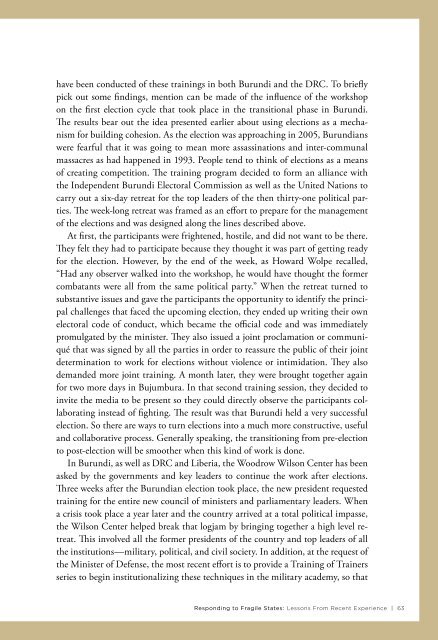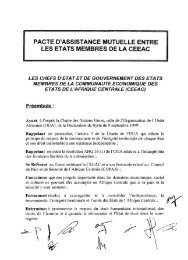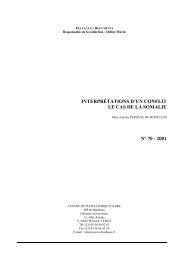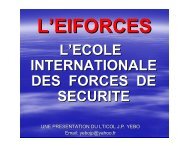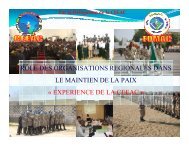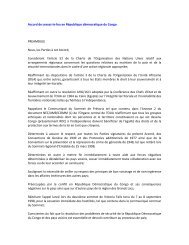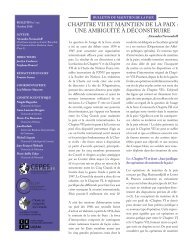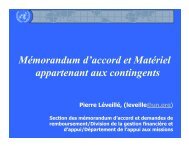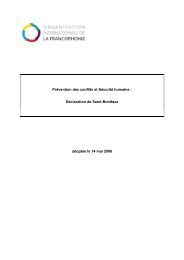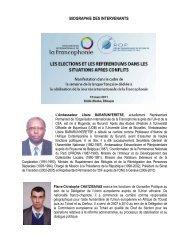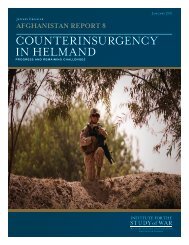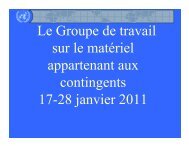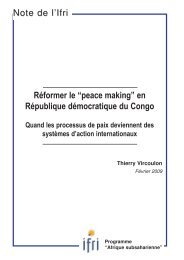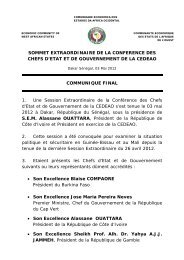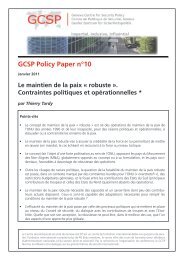engaging fragile states - Woodrow Wilson International Center for ...
engaging fragile states - Woodrow Wilson International Center for ...
engaging fragile states - Woodrow Wilson International Center for ...
Create successful ePaper yourself
Turn your PDF publications into a flip-book with our unique Google optimized e-Paper software.
have been conducted of these trainings in both Burundi and the DRC. To briefly<br />
pick out some findings, mention can be made of the influence of the workshop<br />
on the first election cycle that took place in the transitional phase in Burundi.<br />
The results bear out the idea presented earlier about using elections as a mechanism<br />
<strong>for</strong> building cohesion. As the election was approaching in 2005, Burundians<br />
were fearful that it was going to mean more assassinations and inter-communal<br />
massacres as had happened in 1993. People tend to think of elections as a means<br />
of creating competition. The training program decided to <strong>for</strong>m an alliance with<br />
the Independent Burundi Electoral Commission as well as the United Nations to<br />
carry out a six-day retreat <strong>for</strong> the top leaders of the then thirty-one political parties.<br />
The week-long retreat was framed as an ef<strong>for</strong>t to prepare <strong>for</strong> the management<br />
of the elections and was designed along the lines described above.<br />
At first, the participants were frightened, hostile, and did not want to be there.<br />
They felt they had to participate because they thought it was part of getting ready<br />
<strong>for</strong> the election. However, by the end of the week, as Howard Wolpe recalled,<br />
“Had any observer walked into the workshop, he would have thought the <strong>for</strong>mer<br />
combatants were all from the same political party.” When the retreat turned to<br />
substantive issues and gave the participants the opportunity to identify the principal<br />
challenges that faced the upcoming election, they ended up writing their own<br />
electoral code of conduct, which became the official code and was immediately<br />
promulgated by the minister. They also issued a joint proclamation or communiqué<br />
that was signed by all the parties in order to reassure the public of their joint<br />
determination to work <strong>for</strong> elections without violence or intimidation. They also<br />
demanded more joint training. A month later, they were brought together again<br />
<strong>for</strong> two more days in Bujumbura. In that second training session, they decided to<br />
invite the media to be present so they could directly observe the participants collaborating<br />
instead of fighting. The result was that Burundi held a very successful<br />
election. So there are ways to turn elections into a much more constructive, useful<br />
and collaborative process. Generally speaking, the transitioning from pre-election<br />
to post-election will be smoother when this kind of work is done.<br />
In Burundi, as well as DRC and Liberia, the <strong>Woodrow</strong> <strong>Wilson</strong> <strong>Center</strong> has been<br />
asked by the governments and key leaders to continue the work after elections.<br />
Three weeks after the Burundian election took place, the new president requested<br />
training <strong>for</strong> the entire new council of ministers and parliamentary leaders. When<br />
a crisis took place a year later and the country arrived at a total political impasse,<br />
the <strong>Wilson</strong> <strong>Center</strong> helped break that logjam by bringing together a high level retreat.<br />
This involved all the <strong>for</strong>mer presidents of the country and top leaders of all<br />
the institutions—military, political, and civil society. In addition, at the request of<br />
the Minister of Defense, the most recent ef<strong>for</strong>t is to provide a Training of Trainers<br />
series to begin institutionalizing these techniques in the military academy, so that<br />
Responding to Fragile States: Lessons From Recent Experience | 63


